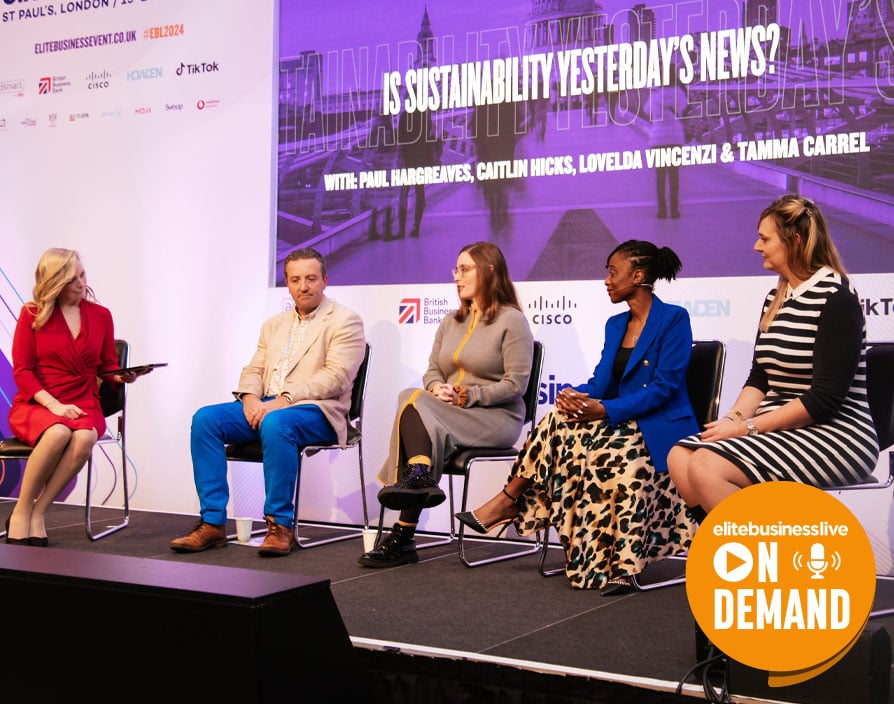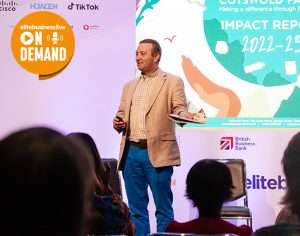Running a sustainable business can come with its challenges. Many of us want to be environmentally friendly and lower our carbon footprint. However, to design a business with sustainability at its core, you must incorporate eco-friendly practices into every operation. Today, it’s critical for companies to practice environmental stewardship. Consumers want products made from sustainable materials, and employees want to work for ethical companies. Even investors are jumping on board, filling their portfolios with companies that follow environmental, social and governance principles. But how does one foster a more sustainable business? Paul Hargreaves, Founder & CEO of Cotswold Fayre & Flourish, was joined by Jax Davey, CEO of Nuevo, Lovelda Vincenzi, Moderating Specialising in Climate and Sustainability Events and Tamma Carrel, Founder of Imvelo Ltd at Elite Business Live 2024 as they discussed ways businesses can be more sustainable in today’s economy.
Sustainability is good for businesses. Despite government uncertainty, many businesses remain committed to environmentally friendly practices. Businesses can act faster and more effectively than governments in driving change, Tamara said. While perfect sustainability isn’t achievable, companies should focus on being authentic and transparent with their customers and investors. She said: “Businesses often act faster than governments and have a greater ability to influence both up and down the supply chain, which is exciting. On the topic of “walking the walk,” I think it’s important to acknowledge that perfect sustainability doesn’t exist.
“Criticizing companies for not being flawless overlooks the reality that sustainability is a journey, not a destination. The focus should be on authenticity, transparency, and living true to one’s values. What the public really wants is to see behind the curtain: to understand what’s working, what’s not, and, most importantly, why. When things aren’t working, it’s valuable to share those experiences so others can learn and improve in the future.” SMEs can look at other businesses’ sustainability practices for inspiration – and not all changes require significant investment. For instance, solar panels now offer quicker returns due to rising energy costs, making them a better investment. Start with cost-free actions and then pursue more expensive initiatives. Grants and funding are available for environmental projects to support sustainability efforts.
Paul said: “Most of our best ideas have come from other businesses. One thing B Corps are required to do is publish their sustainability practices online, so take a look at what others are doing. Not everything has to cost money—some things do, but there are cost-effective options as well. For example, solar panels used to take seven or eight years to pay off, but now, with rising energy costs, that period has dropped to about two and a half years, making it a much smarter investment, even if it requires some borrowing. However, there are many actions you can take that don’t cost anything. Start with those, and then move on to initiatives that require investment. Additionally, there are grants available for environmental projects, depending on your location. There is funding out there to help you improve and become more sustainable.”
Sustainability doesn’t have to be complicated or costly. Simple actions, like reducing travel, going digital, or choosing eco-friendly products, can make a big impact and even save money. There is great value in collaboration as tackling sustainability and the climate crisis does need a collective effort across the board, Lovelda said. Applying business skills to sustainability can uncover many quick and accessible changes that any business can implement.
Lovelda told the audience: “I’d start by echoing what Paul said: it doesn’t have to be complicated. We often talk about how difficult sustainability can be, but simple actions can make a big difference. Do you really need to make that drive? Does everyone need to stay in a hotel? Do you need to print those documents, or can you go digital? Could you source products locally instead of internationally? These small changes, regardless of the size of your business, can also make commercial sense. For instance, going fully digital not only reduces waste but also saves money—a win-win.
“It’s a misconception that sustainable practices require massive investments or cost a lot of money. Simple swaps, like choosing eco-friendly cleaning products or switching to sustainable toilet paper, can have a significant impact. Additionally, there’s great potential for collaboration. Tackling sustainability and the climate crisis requires collective effort; one organisation alone can’t solve it. By partnering with others, you can achieve bigger, faster results. Ultimately, if you apply the same business acumen you use to generate profit to sustainability efforts, you’ll find plenty of quick, easy, and accessible changes that any business, regardless of size, can implement.”
While consumers are concerned about sustainability, they may get confused about how to choose sustainable products. Companies may also struggle to communicate their sustainability efforts effectively with their customers. With new regulations like the EU’s Green Claims Directive and updated U.S. Green Guides, there is increased pressure to avoid greenwashing and ensure accurate sustainability claims. Navigating these changes is crucial for companies to avoid legal issues, and negative publicity, and to protect their market position. Caitlin said: “Ultimately, brands sell to customers, and customers continue to care about sustainability. While concerns like the cost of living crisis and global atrocities weigh heavily on people’s minds, surveys show that the climate crisis remains a top priority. The desire to purchase more sustainable products is growing, but so is consumer confusion about how to do so. As companies strive to address this demand, they too face uncertainty about how best to communicate their sustainability efforts.
“Consumers are increasingly demanding transparency and guidance on which brands to trust, prompting governments to respond with new regulations. The EU’s Green Claims Directive, set to roll out across member states in the next two years, aims to protect consumers from greenwashing—where companies mislead or exaggerate their environmental claims, whether intentionally or unintentionally. In the U.S., the Federal Trade Commission is expected to release updated Green Guides this year, adding further pressure on companies to ensure their sustainability claims are accurate and compliant. For companies, navigating these changes is crucial not only to avoid legal repercussions and negative publicity but also to protect their bottom line. Silence or a perceived lack of action in this space could be detrimental.”
Share via:









































